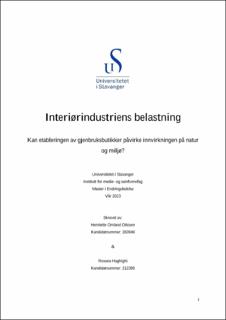| dc.contributor.advisor | Blindheim, Bjørn-Tore | |
| dc.contributor.author | Ottosen, Henriette Omland | |
| dc.contributor.author | Haghighi, Roxana | |
| dc.date.accessioned | 2023-09-15T15:51:24Z | |
| dc.date.available | 2023-09-15T15:51:24Z | |
| dc.date.issued | 2023 | |
| dc.identifier | no.uis:inspera:153030098:93403632 | |
| dc.identifier.uri | https://hdl.handle.net/11250/3089791 | |
| dc.description.abstract | I Norge lever vi i et forbrukersamfunn hvor bruk-og-kast-kultur er på et høyt nivå. Til tross for dette blir det stadig mer fokus på bærekraftige omstillinger i samfunnet. Flere får økt bevissthet over hvordan deres handlinger påvirker natur og miljø, og ønsket om å redusere belastningen blir stadig høyere. Forbruk innen interiør er mye høyere i Norge sammenlignet med flere andre land, og vår forkjærlighet for oppussing og oppgradering av hjemmet går på bekostning av natur og miljø, noe som igjen fører til at vi lever i et overflodssamfunn. IKEA erkjenner også at vi må verne natur og miljø, og derfor har organisasjonen som mål å bli klimapositive innen 2030. En av prototypene for en sirkulær omstilling er Gjenbruksbutikken og IKEA kjøper-tilbake. På bakgrunn av dette vil denne avhandlingen utforske og fordypes i hva Gjenbruksbutikken er og hvordan etableringen av gjenbruksbutikker kan bidra til at IKEA reduserer den belastningen organisasjonen i dag utgjør for natur og klima. Avhandlingen skal beskrive og analysere tematikken langs tre dimensjoner. Disse dimensjonene er sosial organisering, estetiske uttrykk og materiell struktur. Oppgaven er teoretisk fundert på hovedsakelig flernivåperspektivet innad i overgangsteori, ansvarsteori, estetiske teorier og bærekraftig utvikling. Dette vil være bakgrunnen for hvordan oppgaven blir antydet og redegjort. Oppgaven er en kvalitativ forskningsoppgave og benytter rapporter, bøker og artikler, samtidig som intervjuer utføres. Dette vil gi oss empiri for videre forskning og diskusjon. Som resultat viser avhandlingen at sirkulær omstilling i interiørindustrien krever endringer i design, produksjon og forbruksmønster, og at Gjenbruksbutikkens etablering vil i liten grad påvirke belastningen IKEA utgjør for natur og miljø per i dag. Så lenge IKEA fortsetter å produsere nye varer i den grad de gjør i dag, vil Gjenbruksbutikken ikke være en stor nok motvekt for å skape positive miljøendringer. Et samarbeid mellom aktører på mikro-, meso- og makronivå kreves for at bærekraftige omstillinger skal skape positive miljøendringer. Samarbeid mellom aktører på mikro-, meso- og makronivå er avgjørende for at bærekraftige endringer skal skape positive miljøendringer. Dersom et samarbeid mellom ulike aktører ikke eksisterer, er det mindre sannsynlig at en bærekraftig omstilling vil utvikle seg og blomstre (Geels, 2010, 2011, 2019; Köhler et al., 2019; Smith et al., 2010; Agrawal & Gupta, 2018; Lim, 2017; Roberts, 1995). | |
| dc.description.abstract | We live in a consumption society with a high level of throwaway-culture in Norway. Despite this, there is an increasing focus on sustainable changes in our society. More people have become conscious of how their actions influence nature and the environment, and the desire to reduce the burden is growing. Consumption of interior design is much higher in Norway compared to several other countries, and our penchant for upgrading and improving the home comes at the expense of nature and the environment, leading to us living in an affluent society. IKEA also recognizes the importance of protecting nature and the environment, and the company intends to become climate-positive by 2030. Gjenbrukbutikken and the IKEA Buyback & Resell are prototypes for circular transformation. Based on this, the thesis will explore what IKEAs Gjenbruksbutikk is, and if this prototype will reduce IKEAs environmental footprint. The thesis will describe and analyze the topic along three dimensions. These dimensions are social organization, aesthetics, and material structure. The thesis is theoretically based on the multi-level perspective within transition theory, responsibility theory, aesthetic theories, and sustainable development. This will be the foundation for how the assignment is indicated and explained. The assignment is a qualitative research project that will involve the utilization of papers, books, and articles, as well as interviews. This will provide the thesis with empirical data for future research and discussion. As a result, the thesis concludes that circular adjustments in the interior industry requires changes in design, production, and consumption patterns, and that the establishment Gjenbruksbutikken will currently have little effect on the burden IKEA poses to nature and the environment. If IKEA continues to produce new goods to the extent they do today, Gjenbruksbutikken will not be a large enough counterweight to create positive environmental changes. Cooperation between actors at micro-, meso- and macrolevel is crucial for sustainable changes to create positive environmental changes. If a cooperation between different actors does not exists, a sustainable transition is less likely to develop and flourish (Geels, 2010, 2011, 2019; Köhler et al., 2019; Smith et al., 2010; Agrawal & Gupta, 2018; Lim, 2017; Roberts, 1995). | |
| dc.language | nob | |
| dc.publisher | uis | |
| dc.title | Interiørindustriens belastning
Kan etableringen av gjenbruksbutikker påvirke innvirkningen på natur og miljø? | |
| dc.type | Master thesis | |
